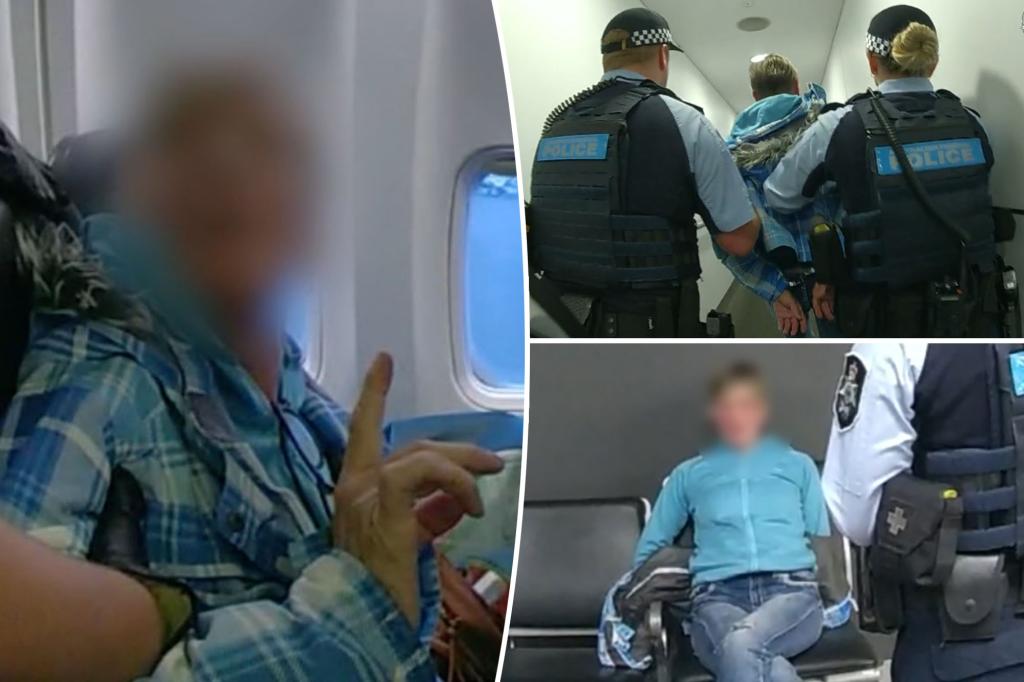Saturday Flight Fiasco: When Dancing Derailed a Plane
In a peculiar incident that gives new meaning to “in-flight entertainment,” a 50-year-old New Zealand woman named Sheree Young found herself in serious legal trouble after what might be described as an impromptu dance performance aboard a Qantas flight. What began as a routine journey from Sydney to Queenstown in July quickly transformed into a cautionary tale about the consequences of mixing alcohol with air travel. While most passengers were settling into their seats and preparing for takeoff, Young apparently had other plans – deciding that the narrow aisle of a taxiing aircraft was the perfect venue for showing off her dance moves, despite crew members’ attempts to intervene.
The incident escalated beyond mere dancing when Young reportedly became belligerent. According to police reports, she ignored safety instructions, directed profanity toward staff members, and continued her dancing despite repeated warnings to return to her seat. The pilot, prioritizing the safety of everyone aboard, made the difficult decision to abort the takeoff procedure and return to the gate. This wasn’t merely an inconvenience – it represented a significant disruption to the airline’s schedule and affected every passenger waiting to depart. Australian Federal Police were summoned to the aircraft to handle the situation, highlighting how quickly an individual’s behavior can transform from merely annoying to a matter requiring law enforcement intervention.
When authorities confronted Young, they encountered resistance and argumentative behavior, though they eventually succeeded in removing her from the aircraft. The flight was able to continue its journey to Queenstown only after her removal, leaving her behind to face the consequences of her actions. Young was allowed to return to New Zealand the following day, but this wasn’t the end of her troubles – merely the beginning of a legal journey that would bring her to court facing serious charges. The incident serves as a striking example of how quickly personal choices can spiral into public spectacles with lasting repercussions, particularly in the confined and regulated environment of commercial aviation.
The legal aftermath proved substantial for Young, who appeared in court on Wednesday facing multiple charges that carried significant penalties. She was charged with failing to comply with crew member safety instructions – an offense that alone could result in a fine exceeding $10,500. More seriously, she faced charges of obstruction and resisting a Commonwealth official, which potentially carries a two-year prison sentence upon conviction. These charges reflect the aviation industry’s zero-tolerance approach to disruptive behavior, especially when it potentially compromises safety. What might have seemed like harmless fun or a momentary lapse in judgment to Young has transformed into a life-altering legal predicament with potential financial and freedom-restricting consequences.
Australian Federal Police Detective Acting Inspector Trevor Robinson emphasized the gravity of Young’s actions, stating that her behavior had placed at risk not only her own safety but that of fellow passengers and crew members. Beyond the immediate safety concerns, her actions caused a delayed departure, creating inconvenience for everyone aboard and potentially affecting connecting flights and travel plans for dozens of others. Robinson’s statement that “anyone misbehaving under the influence of alcohol will be removed from their flight” underscores a firm stance from authorities – that aircraft are not environments where intoxicated disruption will be tolerated, regardless of a passenger’s intentions or explanations. The message is clear: behavior that might be merely embarrassing in other contexts can become criminal in the highly regulated environment of commercial aviation.
Young’s case is unfortunately not isolated. In August, another alcohol-related incident occurred on an Emirates flight bound for Dubai, where an intoxicated passenger verbally abused a flight attendant who refused to serve more alcohol, calling her a “stupid b–h” before being physically restrained. These incidents highlight a persistent problem in air travel – the volatile combination of alcohol, altitude, confined spaces, and the stress of travel. Airlines continue to grapple with balancing passenger comfort and freedom with maintaining safety and order. For travelers, these cases serve as sobering reminders that the consequences of losing control at 30,000 feet can follow you long after landing. What begins as vacation excitement or pre-flight celebration can quickly transform into court appearances, financial penalties, and potentially life-changing restrictions on future travel options. The message from airlines and authorities remains consistent: enjoy your flight, but remember that the rules of responsible behavior don’t disappear when the plane door closes – they become even more important.














